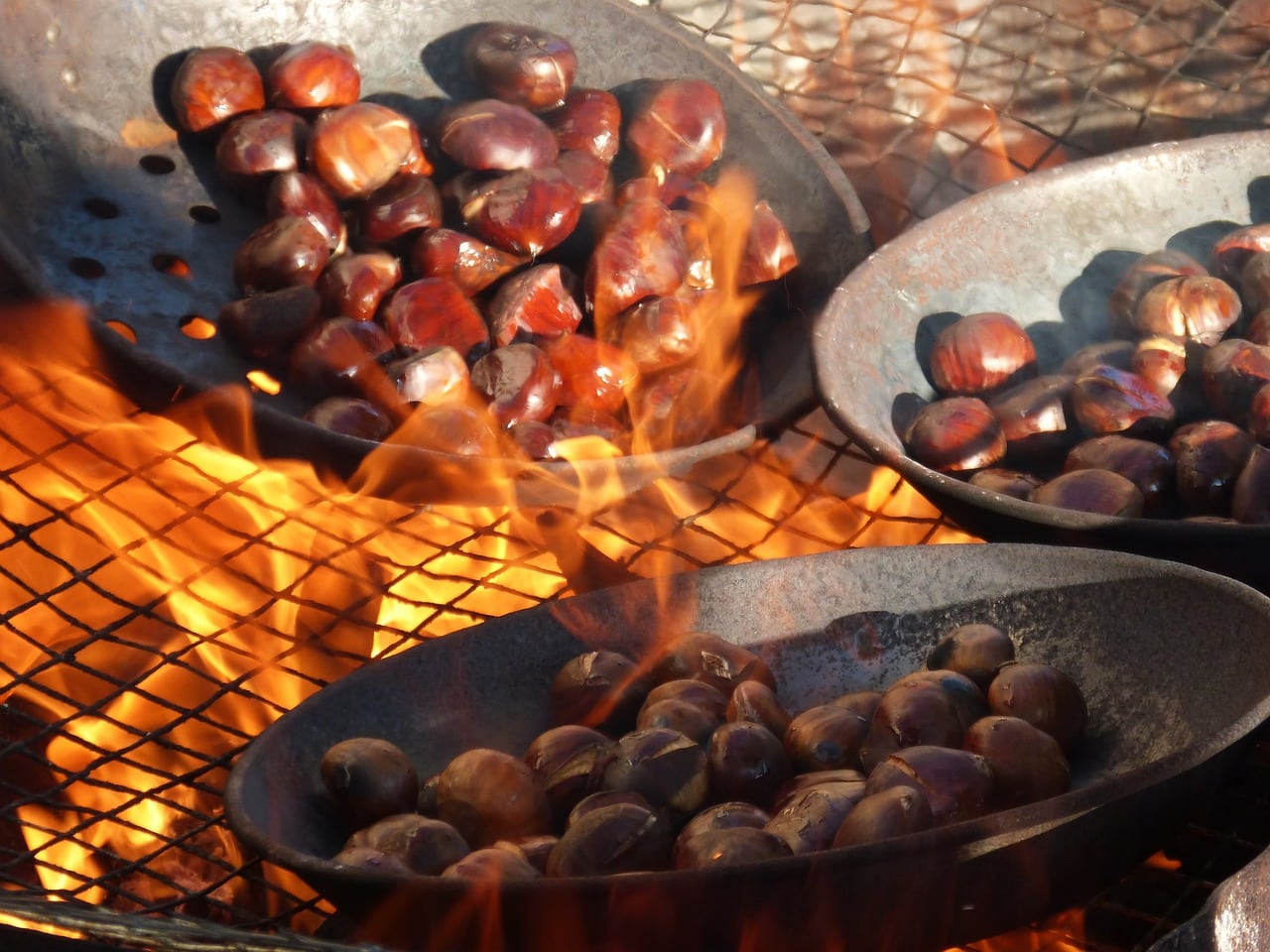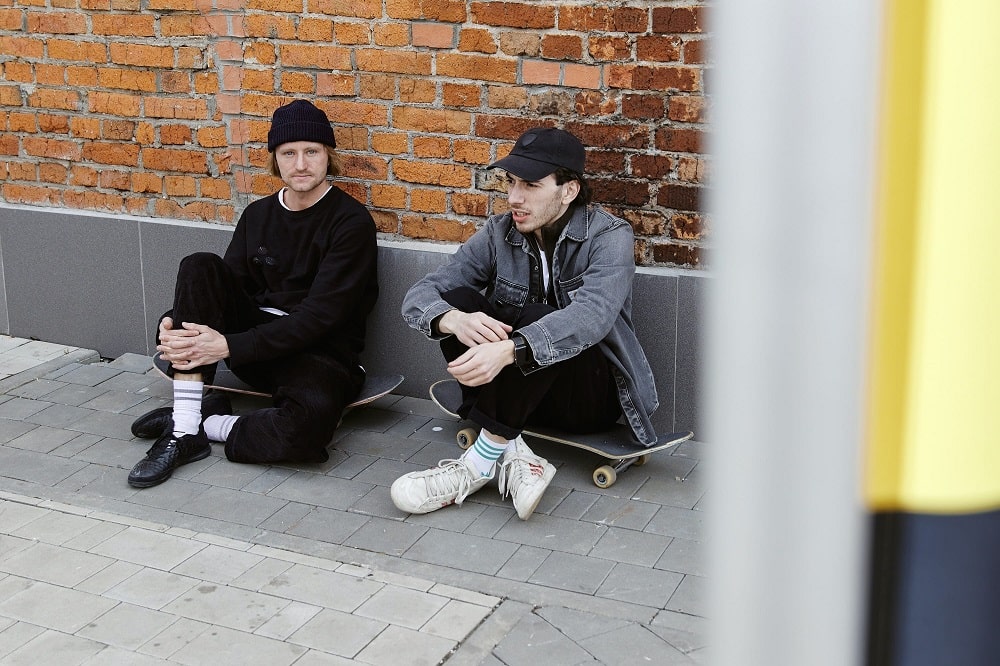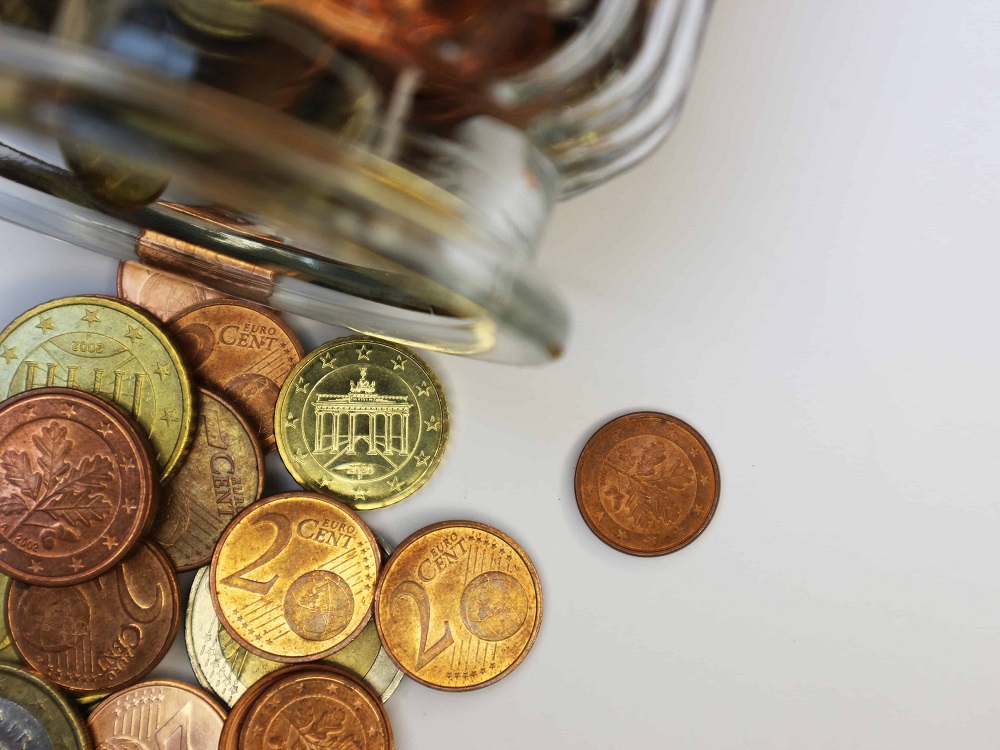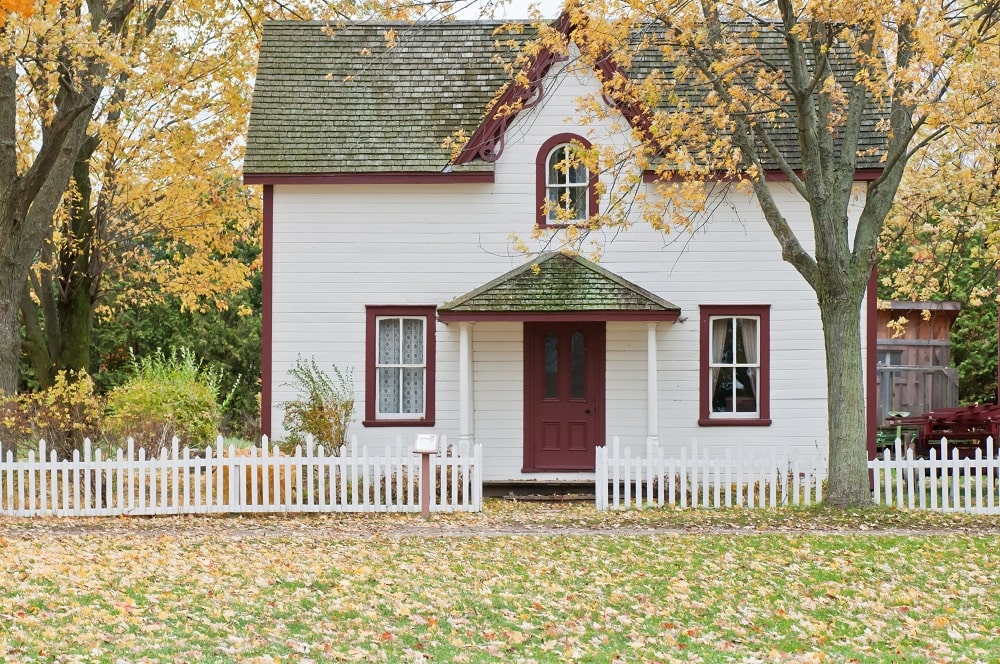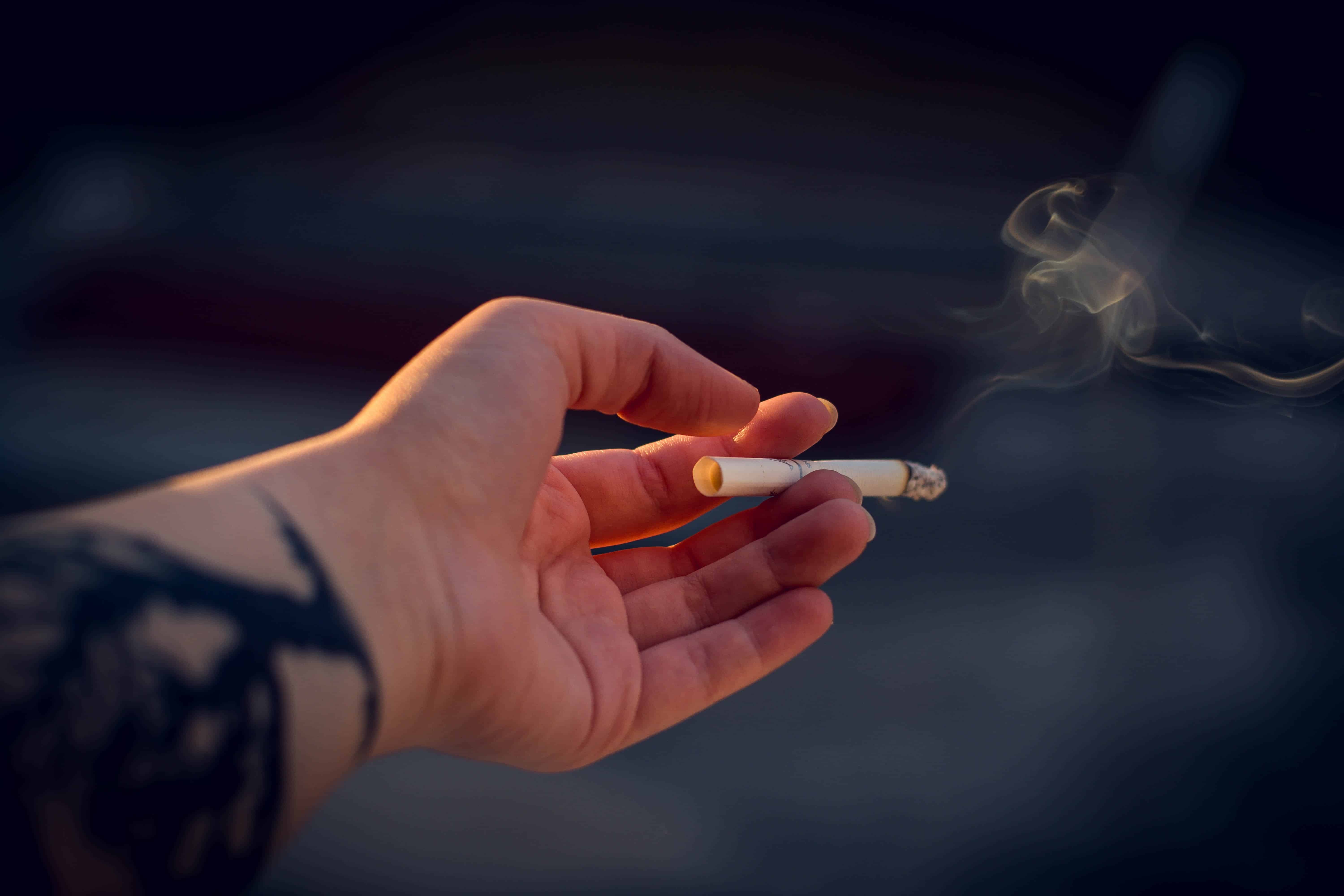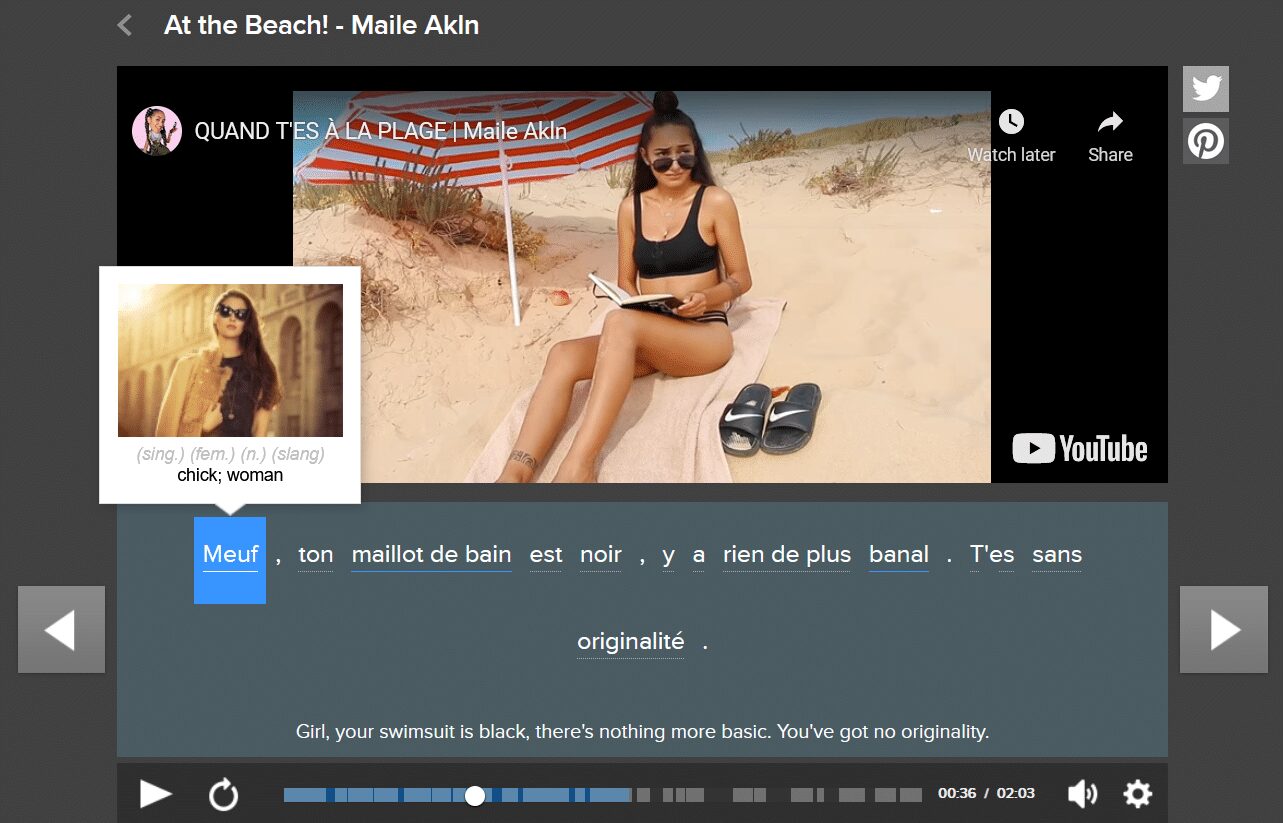Contents
- Common French Slang Words and Phrases
- 1. Ça baigne ? Ça baigne ! — How’s it going? It’s going!
- 2. Arrête de te la péter — Stop showing off
- 3. Je me casse — I’m outta here
- 4. Il capte rien — He doesn’t understand anything
- 5. Laisse tomber — Never mind
- 6. J’ai la flemme — I’m (feeling) lazy
- 7. Sans déc — No kidding
- 8. Parler comme une vache espagnole — Talk like a Spanish cow
- 9. J’ai un petit creux — I’m a little hungry
- 10. Quoi — What (etc.)
- 11. Être dans le coaltar — To be in a daze
- 12. Partir en piste — To go out and get drunk
- 13. Finir sur la paille — To end up destitute
- 14. Demander une rallonge — Request an extension
- 15. Tirer les marrons du feu — To pull the chestnuts from the fire
- 16. Poser une colle — Ask a difficult/tricky question
- 17. Vas-y mollo — Take it easy/Chill
- 18. Zoner — Zone out/Hang around
- 19. Filer un mauvais coton — To be headed for trouble
- 20. En faire tout un fromage — Make a big deal
- 21. Être affublé — To be decked out
- 22. BCBG — Preppy
- 23. Habillé comme la chienne à Jacques — To be dressed shabbily
- 24. Flambant neuf — Brand new
- 25. Faire des siennes — Acting up
- 26. Bordel — Mess
- 27. Balle — Euro
- 28. Blé — Money
- 29. BG — Attractive person
- 30. Baraque — House
- 31. Bobo — Minor injury/Bourgeois-bohemian
- 32. Bouffer — Eat
- 33. Une clope — A cigarette
- 34. Kiffer — To like (someone)
- 35. Mec — Dude
- 36. Meuf — Girl
- 37. Ouf — Phew
- 38. Relou — Annoying
- 39. Être vénère — To be annoyed
- 40. Truc — Thing
- French Internet and Pop Culture Slang
- French Social and Relationship Slang
- French Food-related Slang
- French Regional Slang
- Why Learning French Slang Is Important
- How to Learn French Slang Effectively
168 Authentic French Slang Expressions

When you’re just starting to learn French, you’ve gotta step up and memorize a lot of vocab.
Argot, or French slang, can make all that memorizing way more fun.
It gives you a taste of real French, the authentic language of native speakers.
You can learn some of those French slang expressions right here. Memorize as many as you like, and be sure to drop them in front of your French-speaking friends!
Download: This blog post is available as a convenient and portable PDF that you can take anywhere. Click here to get a copy. (Download)
Before we get into our list, check out this video from the FluentU French YouTube channel to hear some of the most common French slang terms:
Did you already know any of them? Great!
If not, no worries. We won’t cover every slang expression you just saw in our video, but we’ll go over some in more detail as well as plenty of other useful French slang expressions.
Common French Slang Words and Phrases
1. Ça baigne ? Ça baigne ! — How’s it going? It’s going!
Our first French slang expression is similar to the extremely common Q&A phrase ça va, and it means the same thing: “How are you?” “Good!”
This phrase uses the verb baigner (to bathe), and refers to something submerged in a liquid, as in: Ça baigne dans de l’huile (It is bathed in oil).
In fact, that’s likely where this mid-20th century expression comes from! Ça baigne is often associated with the beach, where people se baignent (go for a dip) or are often baignés (bathed) in oil—tanning oil, that is.
-Je t’ai pas vu depuis longtemps. Ça baigne ? (I haven’t seen you in a long time. Everything going okay?)
-Ouais, ça baigne ! (Yeah, it’s going well!)
2. Arrête de te la péter — Stop showing off
While this expression isn’t all that vulgar, it’s definitely not for mixed company.
That’s because the real meaning of the last word, péter, is “to fart.”
And, originally, the la combined with bretelle (suspender), because in the 19th century, holding out one’s suspender and making it pète (snap) against one’s chest was a way of punctuating a brag or show-offy comment.
Nowadays, leave bretelle out of this phrase—unless you’re in Québec!
J’aimerais qu’il arrête de se la péter. Il est hyper arrogant ! (I wish he’d stop showing off. He’s so arrogant!)
3. Je me casse — I’m outta here
This is a very casual, bordering-on-rude way to say that you’re leaving somewhere.
It can also be used as a suggestion: On se casse ? (Should we get out of here?)
And it can even be used as a sort of insult. To say Casse-toi ! to someone means, “Get out of here!” or even “Piss off!”
Don’t say it around just anyone, but if you’re being harassed in the street, a well-placed Casse-toi ! definitely gets the message across.
J’en ai marre de cette situation. Je me casse ! (I’ve had enough of this situation. I’m outta here!)
4. Il capte rien — He doesn’t understand anything
Astute French grammarians will see that the negator ne has been dropped from this phrase, as it has in most French slang expressions.
You can use this phrase as in “he’s super out of it,” or to describe an airhead or someone a few crayons short of a full box.
For more emphasis, you can say, Il capte trois fois rien (He doesn’t understand anything times three). Of course, astute mathematicians will say that three times nothing is still nothing, but French slang isn’t an exact science!
Il est vraiment étourdi. Il capte rien aujourd’hui. (He’s really in a daze. He just isn’t understanding anything today.)
5. Laisse tomber — Never mind
Laisse tomber means “Let it go” or, directly translated, “Let it fall.”
This is a great expression for when the person you’re talking to doesn’t understand what you’re saying and you’re tired of trying to explain… which can happen frequently when you’re learning a language!
This expression has become so common in French that some prefer to use it in verlan (a special type of French slang). The verlan for laisse tomber is laisse béton, which becomes all the more amusing when you realize that béton also means “concrete.”
Laisse tomber—ça ne vaut pas la peine de se disputer. (Let it go—it’s not worth arguing about.)
6. J’ai la flemme — I’m (feeling) lazy
Flemme comes from the same root as flegmatique, though while the latter describes someone of a relaxed and peaceful nature, flemme is more negative in nature and refers to laziness.
Someone using this phrase is saying that they aren’t in the mood to do a task set before them, or that they’re in a general state of laziness at that point in time.
Je dois finir mes devoirs, mais j’ai la flemme—je vais plutôt faire la grasse matinée. (I should finish my homework, but I’m feeling lazy—I’m going to sleep in instead.)
7. Sans déc — No kidding
Those born before the early ’90s will remember when “duh” became the word of choice for teens across America. So is sans déc for French teens today.
Sans déc is the abbreviated version of Sans déconner, which means approximately “You’re not kidding,” though the word choice is far stronger than “kidding.”
This is a fairly vulgar expression that you’ll want to avoid in mixed company. For a similar but tamer expression, try sans blague (no joke).
-Tricoter un pullover, c’est un vrai effort ! (Knitting a sweater is a real effort!)
-Sans déc. Il m’a fallu un mois pour finir. (No joke. It took me a month to finish.)
8. Parler comme une vache espagnole — Talk like a Spanish cow
This expression is usually used to describe someone’s foreign language skills… and it’s not a compliment. It’s a colorful way of saying that they don’t speak very well.
In fact, you’ll often hear French speakers complain that they speak English comme une vache espagnole (“like a Spanish cow”).
If someone ever does compare your language skills to a Spanish cow, you should be sure to have a ready retort to prove them wrong.
C’est difficile de l’écouter parler en français. Elle le parle comme une vache espagnole ! (It’s hard to listen to her speak French. She speaks it like a Spanish cow!)
9. J’ai un petit creux — I’m a little hungry
In French, saying that you have a creux (hollow) means a very specific place—your stomach.
This isn’t commonly used to express great hunger, but it comes in handy when someone asks if you’d like to eat and you want to say something like “I’m a bit peckish” or “I could eat.”
If you do want to use this expression when you’re very hungry, just remove the petit (little) and replace it with a grand (big).
Je veux pas bouffer maintenant; j’ai juste un petit creux. (I don’t want to pig out; I’m just a little peckish.)
10. Quoi — What (etc.)
Those familiar with French slang probably don’t see how this counts as an expression, but quoi isn’t always just “what.”
In recent years, French speakers have started using quoi as a general way to punctuate sentences. It has no real meaning, save one of slight emphasis or summary.
It’s actually difficult to use quoi incorrectly. Start tacking it on to the end of your sentences for emphasis, and see how impressed your French friends are!
Je vais marcher au restaurant pour la grande bouffe. C’est une sorte d’exercice, quoi. (I’m going to walk to the restaurant for the big feast. It’s sort of exercising, whatever.)
Elle aime les sucreries, les bonbons, s’empiffrer de chocolat, quoi. (She likes sweets, candies, binging on chocolate, and so forth.)
11. Être dans le coaltar — To be in a daze
The literal translation is: “To be in the coal tar.” Coal tar is a thick, black liquid byproduct of coal processing. It has some purported medicinal purposes but is mostly used for paving roads and waterproofing roofs.
If you’re in this icky stuff, it means you’re not thinking clearly—you’re in a daze, you’re dizzy or disoriented.
There are two similar expressions: être dans le cirage (to be in (wood/shoe) polish) and the more modern variation être dans le pâté (to be in the pâté, a finely ground mixture of meat and fat).
J’ai travaillé jour et nuit, sans cesse. Je me sens vraiment dans le coaltar ! (I worked night and day, without a break. I really feel like I’m in a daze!)
12. Partir en piste — To go out and get drunk
Une piste literally means “a trail” or “a track,” but partir en piste is a way of saying, “to go out drinking”—and not just a beer after work.
It’s used for planned debauchery in Bretagne (Brittany), where the expression means getting “fall-down” drunk. It has a similar connotation in French-speaking Switzerland, though the Swiss version is a bit milder—perhaps causal socialization that then escalates to inebriation.
If you’re more interested in dancing than drunkenness, you can also use partir en piste to mean “hit the dance floor.”
Nous sommes partis en piste hier soir et j’ai toujours la gueule de bois. (We went out drinking last night and I still have a hangover. [literally, “wooden mouth”])
Alice aime bien danser; donc, elle a demandé à Patrick de partir en piste. (Alice really likes to dance, so she asked Patrick to go out on the dance floor.)
13. Finir sur la paille — To end up destitute
No matter where you started, finir sur la paille (literally “to finish on the straw”) means that you end up poor.
This expression may go back to the story of Jesus’ nativity, in which the newborn was laid in a manger. Traditionally, the bedding is portrayed as straw, which is used for farm animals—a humble place for humans to rest.
If someone ends up “on the straw,” they are out of resources with no money or means whatsoever.
Si tu fais confiance en un financier louche, tu peux finir sur la paille ! (If you put your faith in a shady financial advisor, you can end up broke!)
14. Demander une rallonge — Request an extension
Une rallonge (an extension) can refer to many things: an extra leaf for your dining table, an extension cord or even extra time on a deadline.
Demander une rallonge can also be used to ask for an advance on your salary, or simply for some extra money.
And in the context of a courtroom, it can be a way to ask for a continuance in a trial, if more time were needed to prepare a case.
Après s’être rendu compte qu’elle n’avait pas assez de temps pour finir sa dissertation, Anne a demandé une rallonge à son prof. (After having realized that she wouldn’t have enough time to finish her term paper, Anne asked her professor for an extension.)
15. Tirer les marrons du feu — To pull the chestnuts from the fire
Originally, the whole expression was tirer les marrons du feu avec la patte du chat (to pull the chestnuts out of the fire with the cat’s paw), in reference to Jean de la Fontaine’s poetic adaptation of “Le Singe et le Chat” (“The Monkey and the Cat”) in 1679.
Figuratively, it was a way of saying that someone was doing something dangerous or risky in order to get a reward, traditionally for the benefit of someone else.
The phrase was shortened to simply tirer les marrons du feu, and while it can still mean doing something dangerous for someone else’s benefit, it can also mean that you will reap the reward from the risk.
Si je risque mon propre argent dans cet investissement, je pourrais tirer les marrons du feu et gagner beaucoup. (If I risk my own money on this investment, I could profit it from it and gain a lot of money.)
16. Poser une colle — Ask a difficult/tricky question
Colle means “glue” or “paste.” Have you ever had to ask a difficult or “sticky” question? In French slang, you’d call this poser une colle.
It can also mean to “pose a riddle,” ask a trick question or make someone guess about something. For example, il m’a posé une colle means “he stumped me,” and se poser une colle means that someone has put you on the spot or forced you into an awkward position.
Colle can also be slang for after-school detention or a classroom test.
Hélène est une fille pleine de curiosité. Chaque jour, elle pose une colle à ses parents et ils ont du mal à y répondre. (Hélène is very curious girl. Every day, she asks her parents a tricky question and they have a hard time answering it.)
17. Vas-y mollo — Take it easy/Chill
If tempers are flaring, this is an informal way you might tell an agitated person to tone down their anger and chill out a bit.
It can also mean to approach something carefully, slow down or take it slow. Mollo is a hip, slang way of saying mollement—an adverb meaning “softly,” “lazily” or “half-heartedly.”
–Je peux pas croire ce qu’il a fait ! (I can’t believe what he did!)
–Vas-y mollo. Ce n’est pas si mal que ça. (Take it easy. It’s not that bad.)
Vas-y mollo ici. Ce travail est délicat. (Go lightly here. This is delicate work.)
18. Zoner — Zone out/Hang around
As French slang, zoner is much like “zoning out” in English. As a regular -ER verb, zoner means “to hang around,” “to loiter,” “to bum around” or “to slum it.”
It’s a particularly popular term in French hip-hop. Djadja & Dinaz use the expression Je zone extensively in their song by that title. Artist RK has two songs that use this expression: “Zone” and “J’ai trop zoné.”
Moi, je suis trop épuisé pour travailler. Je vais simplement zoner avec mes potes aujourd’hui. (I’m too wiped out to work. I’m just going to chill out with my friends today.)
19. Filer un mauvais coton — To be headed for trouble
This expression means you’ve got a bad attitude, you’re headed down the wrong path, you’ve fallen on hard times, you’re in a funk or you’re just cranky and moody.
Literally it’s “to spin a bad cotton,” though it can also be used to mean that someone’s health is in decline. You might say it when you feel a cold coming on or use it to describe a period of illness in someone’s life.
Ces ados filent un mauvais coton. Ils zonent avec des voyous dans les banlieues de Paris. (These teenagers are on a bad path. They hang out with hooligans in the Parisian suburbs.)
J’ai mal à la gorge. Il se peut que je file un mauvais coton ! (I have a sore throat. I might be getting sick!)
20. En faire tout un fromage — Make a big deal
In English, we might say, “to make a mountain out of a molehill” or “to make a federal case out of it.”
This French slang phrase literally means to make “a whole cheese” out of a situation. Because, in France, cheese is a big deal.
A variation is faire tout un fromage de quelque chose (to make a big deal out of something). You can substitute in the drama-provoking topic for quelque chose.
C’est toujours un drame avec Lucie. Quoi qu’il arrive, elle en fait tout un fromage. (It’s always drama with Lucie. No matter what happens, she blows it all out of proportion.)
21. Être affublé — To be decked out
This versatile expression comes from the verb affubler (to deck out), and it can mean to be decked out in (as in clothing), to be rigged up with (like a bomb or something mechanical) or to be saddled or stuck with something (like a nickname).
Être affublé(e) can have either a positive or a negative connotation, depending on the context.
Je vais à une fête d’anniversaire ce soir, où je serai affublé d’un chapeau pointu et pailleté. (I’m going to a birthday party this evening, where I’ll be decked out in a glittery, pointed hat.)
À cause de sa chevelure extraordinairement longue, elle était affublée du sobriquet “Rapunzel.” (Due to her extraordinarily long hair, she was saddled with the nickname “Rapunzel.”)
Son portable est affublé d’une perche à selfie. (Her smartphone has a selfie stick attached.)
22. BCBG — Preppy
In polite circles, this acronym is short for bon chic, bon genre, which you’d say about someone with a “preppy” style who went to all the right schools and doesn’t lack money.
It’s not exactly calling someone a snob, but it’s not necessarily a compliment, either.
You can also use BCBG to talk about something posh, swanky or fashionable, such as a trendy nightclub. In fact, those into fashion may have recognized the term.
It can also stand for beau cadre, bon goût (good class, good taste), along with a less family-friendly variation. Suffice to say: context matters.
Ma sœur et moi, nous sommes tout à fait différentes. Moi, je porte des vêtements chic minables; elle s’habille en style BCBG. (My sister and I, we’re completely different. Me, I wear shabby-chic clothes; she dresses preppy.)
23. Habillé comme la chienne à Jacques — To be dressed shabbily
At the other end of the fashion spectrum is habillé(e) comme la chienne à Jacques (to dress like Jacques’ female dog). This colorful expression comes from Québécois slang.
As one story goes, a 19th-century man named Jacques Aubert lived in Bas-du-Fleuve (also called Bas-Saint-Laurent). Jacques had a female dog, whose fur had fallen out due to illness.
To keep his hairless canine warm, Jacques outfitted her with some of his old, ratty sweaters—and henceforth came the phrase.
Il n’est pas du tout BCBG. Il est toujours habillé comme la chienne à Jacques. (He’s not posh at all. He always dresses like a slob.)
24. Flambant neuf — Brand new
For something that’s brand new, shiny new, sparkling new or brand-spankin’ new, you can describe it with French slang as flambant neuf (“flaming” new).
Outside of counting, neuf refers to something newly made. This is in contrast to nouveau—something that’s new to the speaker, and not necessarily something newly produced or created.
Remember that like many adjectives in French, neuf changes to match the word it modifies: masculine singular is flambant neuf while the plural is flambant neufs, and feminine singular is flambant neuve while the plural is flambant neuves.
Il me semble que tout le monde veut un portable flambant neuf, équipé de toutes les dernières fonctionnalités. (It seems to me that everyone wants a shiny new smartphone, equipped with all the latest features.)
Ces fringues sont flambant neuves—elles gardent encore ses étiquettes ! (These clothes are brand-spankin’ new—they still have their price tags on!)
25. Faire des siennes — Acting up
Faire is that indispensable French verb that means “to make” or “to do.” Des is a plural article which can mean “some” or “of the.” Siennes gets a little tricky, though. It’s the feminine plural form of “his” or “hers.”
All together, faire des siennes usually means something like, “to be acting up” or “to be out of commission.” However, it can also be translated as “to be up to his/her usual tricks.”
Le bambin faisait des siennes, comme toujours, et ses parents ont dû le mettre dans sa chambre. (The toddler was getting into mischief, as always, and his parents had to put him in a time-out in his bedroom.)
Même après des années en prison, l’escroc continue à faire des siennes. (Even after years in prison, the con artist is still up to his old tricks.)
26. Bordel — Mess
English has borrowed this word in the form of “bordello.” And yes, in French bordel literally means “brothel.”
However, these days bordel is more commonly used to describe a place, person or situation that’s a huge mess.
It’s thought that this slang term came about due to the messy situations in and around brothels in the 19th century. Either way, you’ll now hear people using bordel to express their frustration at something that’s chaotic and disorganized.
Personne ne sait ce qui se passe. Quel bordel ! (No one knows what’s going on. What a mess!)
27. Balle — Euro
In the singular, a balle is a bullet. But back in the day, balles was used as a slang word for francs, the French currency pre-2002.
When France moved on to the euro, balles moved with it and is still sometimes used in reference to money.
-J’aime ton pantalon. (I like your pants.)
-Merci. Je l’ai acheté au marché pour 15 balles. (Thanks. I bought them at the market for 15 euros.)
28. Blé — Money
Blé literally translates as “wheat” in English. Figuratively, though, it’s become a popular way of referring to money.
This is pretty similar to how you might say you’re “bringing in the bread” in English, where blé represents something essential that money can buy.
In French, you can also refer to money as fric or pognon, neither of which has its own meaning aside from its slang use.
Il gagne beaucoup de blé. (He earns a lot of money.)
29. BG — Attractive person
BG here stands for either beau gosse, meaning “good-looking guy,” or belle gosse, “good-looking girl.”
Gosse on its own is slang for “a child,” though, so watch how you use it!
And if you’re in Quebec, gosse is feminine and is used as a slang word for a part of the male anatomy that’s generally in the plural… So if you’re planning to use this slang in Canada, be aware of that difference.
Le serveur de ce restaurant est BG. (The waiter in this restaurant is a hottie.)
30. Baraque — House
The word baraque literally means “shanty,” which is a small house or hut, typically made of planks. Despite its connotation as a shoddily built small structure, the French slang word is used to refer to any house.
You can also use the adjective form, baraqué, to describe someone who’s really muscular. Basically, you’re saying that the person is “well-built,” instead!
On habite dans une grosse baraque avec 10 colocs. (We live in a huge pad with 10 other people.)
En règle générale, les joueurs de rugby sont plus baraqués que les joueurs de foot. (Generally speaking, rugby players are more muscular than football players.)
31. Bobo — Minor injury/Bourgeois-bohemian
Stubbed your toe and got a booboo? Use bobo in French for such une blessure (an injury). Like in English, this is baby talk that young people commonly use when referring to minor injuries like cuts and bruises.
Around 2000, the word gained a second meaning. A combination of bourgeois (bourgeois) and bohème (bohemian), bobo in this way is used to describe a snobby class of people who don’t have much wealth but still get high-quality and upper-class things thanks to careful spending.
-Qu’est-ce qu’il y a ? (What’s the matter?)
-J’ai un bobo sur le pied. (I have a scratch on my foot.)
Elle vient d’utiliser tout son salaire pour s’offrir un sac à main Gucci. C’est une bobo. (She just used her whole paycheck to buy herself a Gucci handbag. She’s a bourgeois-bohemian.)
32. Bouffer — Eat
Bouffer literally means to “puff up” or “balloon” in size. But when you’re stuffing your face, you can use bouffer instead of manger (to eat).
And in turn, la bouffe can be used as another word for “food.”
Although the word isn’t vulgar or offensive, it does have a rather “I’m about to cram food into my mouth” sound to it, so make of that what you will.
J’ai trop mangé. J’ai bouffé un steak tartare avec des frites suivi d’une grosse tarte aux pommes. (I ate too much. I ate a steak tartare with fries followed by a big slice of apple tart.)
Je suis allé en ville pour acheter de la bouffe. (I went into town to buy some food.)
33. Une clope — A cigarette
A commonly used slang word, especially in Paris, une clope is the argot for cigarette. You can use it in the same way as you’d say “can I bum a cig?” in English.
Une clope was originally used to just mean a cigarette butt, but it’s since become a favorite slang term for the whole, presumably unsmoked, object.
Fun fact: Originally the word was masculine, but now it can be either gender—although the feminine is more common.
T’aurais pas une clope ? (You don’t happen to have a cig, do you?)
34. Kiffer — To like (someone)
This slang word is primarily used by younger people for “liking someone.” It’s not declaring your love for the person, but more like telling them you “dig them.”
The word comes from kif, which is Arabic for hashish. So using kiffer with someone means you’re telling them that they’re like smoking a good one.
Kiffer can also be used to talk about something you really enjoy doing, though this is less frequent.
Je kiffe ton frère. (I like your brother. [I’m romantically interested in him.])
Je kiffe faire de la voile. (I really enjoy sailing.)
35. Mec — Dude
Mec is a truly versatile French slang word.
It can mean your boyfriend, or just a guy in general. Or it can be used similarly to “bro” in English, as a term of affection between friends.
You can even use the word to get someone’s attention or greet a friend, as in “hey, dude!”
Il est beau, ce mec. (That guy is good-looking.)
Tu viens avec ton mec ? (Are you bringing your boyfriend?)
36. Meuf — Girl
Meuf is the verlan version of femme, and the feminine version of mec. Like mec, the term can be used to refer to your girlfriend or simply any female.
Unlike mec, however, it can have a pejorative connotation and come across as rude and disrespectful, especially in Canada.
Ma meuf vient avec nous. (My girlfriend is coming with us.)
37. Ouf — Phew
Something that’s ouf is completely “nuts” or “awesome.”
It’s the interjection “phew!” in French, as well as the backward version of fou (crazy, awesome).
Mon frère est ouf. (My brother is nuts.)
On a fait un truc (de) ouf hier. (We did something crazy awesome yesterday.) *Here, ouf can work as an adjective without the de, or as a noun with the de. It’s up to you!
38. Relou — Annoying
Relou is verlan for lourd (heavy, taxing) and the equivalent of chiant, which means “annoying,” “exasperating” or “tiresome.”
You can use relou about a person to say they’re annoying, or about a situation to say that it sucks.
C’est trop relou ! (That sucks!)
39. Être vénère — To be annoyed
A verlan of être énervé (to be mad/on edge), être vénère is used to express that you’re annoyed or angry. You can use it as a noun or a verb.
Pay attention to context, though, because vénéré means “revered” or “worshiped”!
Mathieu est vénère. (Matthew is annoyed.)
40. Truc — Thing
Much like we might say, “You know… the thingy?” when we’ve temporarily forgotten the name of something in English, this French slang term can be used to fill in for a word you don’t know or can’t remember.
It can also be used when talking about activities, as in: “That’s really not my thing.”
Peux-tu me passer ce… truc ? (Can you hand me that… thingy?)
Désolé, le chant n’est pas mon truc. (Sorry, singing isn’t my thing.)
French Internet and Pop Culture Slang

Even though many people admire France for its history and historic cities and towns, that doesn’t mean that the French language doesn’t keep up with the times. Here’s a starter list of French internet and pop culture slang to help you out.
- Boucler — To finish something quickly
- Ça déchire — That’s awesome
- Flemme — A feeling of laziness or not wanting to do something
- Bosser — To work, to hustle
- Se taper un délire — To have a blast
- Être à l’ouest — To be out of it
- Faire un selfie — To take a selfie
- Être à la cool — To be chill
- Avoir la flemme de — To not feel like doing something
- Un pote — A friend
- Être à la ramasse — To be clueless
- Un truc de ouf — Something crazy, amazing
- Un keuf — A cop
- Un troll — A troll
- Un mème — A meme
- Un hashtag — A hashtag
- Un DM — A DM
If you’re interested in diving into even more French Internet slang, check out this post.
French Social and Relationship Slang
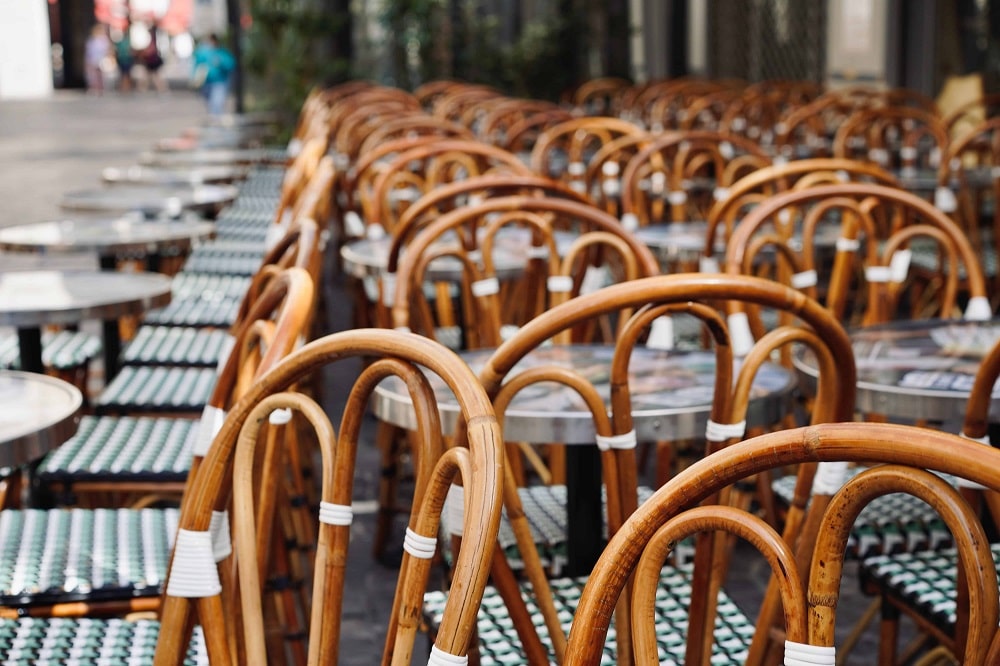
When living in a city like Paris, you’ll have plenty of opportunities to use slang about your social life and relationships. Here’s a list to get you started:
- Se mettre en couple — To become a couple
- Un rencard — A date
- Un coup de foudre — Love at first sight
- Être en train de flirter — To be flirting
- Draguer — To flirt or hit on someone
- Avoir un crush — To have a crush on someone
- Une amourette — A fling
- Être dans la friendzone — To be in the friendzone
- Un plan cul — A casual hookup
- Un ex — An ex
- Faire la tête — To sulk or be in a bad mood
- Être en froid avec quelqu’un — To be on bad terms with someone
- Être en couple libre — To be in an open relationship
- Un plan à trois — A threesome
- Avoir le béguin pour quelqu’un — To have a crush on someone
French Food-related Slang

You know the French love to eat, but what they love even more is talking about food. Here’s a good starter list to get you sounding like a local as you discuss cuisine.
- Un p’tit dej’ — Abbreviation for petit déjeuner, meaning breakfast
- Un bide — A flop of a meal
- Un casse-croûte — A snack or light meal
- Un amuse-gueule — An appetizer
- Un goûter — An afternoon snack
- Miam — An exclamation indicating something is delicious, like “yum”
- Grignoter — To nibble
- Un quatre-heures — A late-afternoon snack
- Un gueuleton — A feast, a big meal
- Un casse-dalle — A quick bite
- Un happy hour — Happy hour
- Picorer — To peck
- Un pique-nique — A picnic
- Se taper la cloche — To pig out
- Un glouglou — Wine
French Regional Slang

French is spoken all around the world and each area tends to come up with their own unique slang words. Here’s a list of some of the most fun slang terms:
- Un char — A car (French Canadian)
- Un dépanneur — A convenience store (French Canadian)
- Un chum — A boyfriend or a male friend (French Canadian)
- Une blonde — A girlfriend (French Canadian)
- Être magané — To be tired or worn out (French Canadian)
- Un lunch — A mid-day meal or packed lunch (French Canadian)
- Être tanné — To be fed up or tired of something (French Canadian)
- Une tuque — A knitted winter hat (French Canadian)
- Une bière frette — A cold beer (French Canadian)
- Faire la piasse — To make money (French Canadian)
- Un party — A party or gathering (French Canadian)
- Une patente — A thing or object (French Canadian)
- Chocolatine — A type of pastry similar to a croissant, known as a pain au chocolat in standard French (South West of France)
- Un gavroche — A street kid or rascal (particularly associated with Paris)
- Un plouc — A derogatory term for someone perceived as unsophisticated or rural
- Un gaulois — A term sometimes used to humorously refer to French people, evoking the ancient Gauls
- Un pote — A friend (widespread slang in French-speaking regions)
- Un boulot — A job or work (widespread slang in French-speaking regions)
- Un keuf — A police officer (widespread slang in French-speaking regions)
- Un bouquin — A book (widespread slang in French-speaking regions)
- Un blase — A name or nickname (widespread slang in French-speaking regions)
- Du fric — Money (widespread slang in French-speaking regions)
- Du flouze — Money (France, particularly used in urban areas)
- Du pognon — Money (widespread slang in French-speaking regions)
- Un bled — A small town or village (France)
- Un beur / Un rebeu — A person of North African descent (France)
- Un blédard — A person from North Africa or with North African origin, can also be used for people from West Africa (essentially the common African immigration in France). A rather derogatory or humorous term to be used only between friends, so be careful! (France)
- Un gosse — A child or kid (widespread slang in French-speaking regions)
- Un piaf — A bird (widespread slang in French-speaking regions)
- Un rencard — A date (widespread slang in French-speaking regions)
- Un bateau-mouche — A tourist boat (France, particularly used in Paris)
- Un frichti — A home cooked meal (France)
- Un déjeuner — Breakfast (Southwest France, Belgium, Switzerland and Canada)
- Un dîner — Lunch (Southwest France, Belgium, Switzerland and Canada)
- Tu m’emboucanes ! — “You’re getting on my nerves!” (most common in Marseilles)
Slang Used in Southwest France
There are many slang words, phrases and expressions used in Southwest France. Here are some of the common ones:
- Escaner — To choke on something
- Empapaouter — To scam
- Bisquer — To throw a fit/have a tantrum/be angry
- Se biturer — To get drunk (used in some other regions as well)
- Déquiller — To quickly knock something over. For example: “Il a déquillé la statue !” , which means “He knocked over the statue!”
- Faire monter l’aïoli — To get things heated up, make someone mad or liven things up
- Bouléguer — To move, stir or mix, like remuer in standard French. Used as a reflexive verb (se bouléguer), this means to get a move on or get going, just like the standard reflexive se remuer. Boulègue-toi le cul is thus a common way to tell someone to get his rear in gear.
- Être mal fagoté — To be badly dressed (the verb se fagoter means to dress yourself badly or strangely)
- Tcharer / tchatcher — These verbs come from the English “to chat,” and that’s what they mean
- Mettre le ouaï — To get things all crazy and mixed up, to screw around with stuff or to get the action going
- Brave — An adjective used to describe someone who’s too servile or a doormat (in standard French, it means “courageous”)
- Espanté — Amazed, surprised (you can say “ça m’espante” when something surprises you)
- Fadas — Crazy, or fou in standard French
- Barjo — Another word for crazy and can also mean strange or stupid (an alternate spelling is barjot)
- Trop — Used in place of très to mean “too” or “excessively,” and sometimes before an adjective to mean “very”
- Un pitchoun / une pitchoune (m./f.) — Popular term for un enfant (child), as well as a general term of endearment for all ages
- Les drôles — Sometimes used to refer to children
- Une poche / un pochon — A bag or sack
- Une malle — The trunk/boot of the car (in standard French, it’s used to refer to a travel trunk or case)
- Une rocade — A beltway (ring road in the UK)
- Un cague-braille — Pants that are too big
- Eh bèh — A filler word used to fill pauses when speaking
- Tè — Used like the standard French tiens as an interjection or at the beginning of a sentence when you’re still thinking up what to say
- Sifaut — An extremely common shortening of s’il faut (if it must be) that simply means “maybe”
- Adieu / Adiou — Used for both greeting people and saying goodbye, from the Occitan adiu (used in some parts of Southwest France)
- Boudu — A very light swear word from the Occitan bon diu, or “good God”
- Fascaga — A pretty vulgar way to tell someone off, from the Occitan fas cagar, which suggests to someone that he should go defecate
- Parigot — Slang for a Parisian, with the implication that the person in question is kind of a snob
- Un pec / une pegue — An idiot, taken from the Occitan pec/pèga
- Avoir le froid dessus — An expression that describes being cold and unable to find a way to get warm
- Ça pègue — That works/That’s fine
- Il fait frisquet — It’s a bit chilly
- Tu roumègues ? — Are you upset with me/complaining to me/grousing?
- Aller péter — To go a great distance, generally too far. For example: Il faut aller péter à l’autre bout de la ville. (It’s necessary to go all the way over to the other side of the city.)
- Avoir la cagne — If you say j’ai la cagne you’re feeling lazy, or not really up to doing something (just like standard French’s avoir la flemme)
- Il me tarde — An expression of impatience or looking forward to something, like j’ai hâte in standard French or “I can’t wait” in English (sometimes used in Northern France as well)
- Pétanque (f.) — A summer game popular throughout France (particularly in the Southwest) involving throwing baseball-sized balls as close as possible to a smaller ball
- Pastis (m.) — A flagship Southwestern France drink (an anise liquor, mixed with water) often ordered by the brand name, Ricard
- Férias — Small town festivals typical of Southwest France and Spain with parades, music, corridas (bullfights) and traditional food and dance
- Trou gascon — Literally translating as the “Gascon hole,” this refers to the Gascon tradition of drinking the region’s celebrated aged brandy, armagnac, during a multiple-course meal, which supposedly helps to reset digestion to make space for the next course.
For even more French regional slang, check out this post on Quebecois slang.
Why Learning French Slang Is Important
If you really want to learn to speak French like a native, you can’t neglect learning French slang words and phrases.
Here’s why:
French slang is essential to conversation. No one talks like a textbook. In any language, slang is one of those things people use all the time without even realizing it.
French slang requires some explanation. Even if you understand the individual words, they can be used in contexts that often won’t make literal sense. That’s why it’s important to learn French slang phrases, just as you would other fundamental vocabulary.
French slang words give you cultural insights. As you learn slang, you get glimpses into French history, literature and culture. When you understand the origin of French slang words and phrases, you can connect better with the people who speak the language.
French slang provides nuance. Learning French slang allows you to express your feelings and emotions in a more vivid way, so you can convey confidence, doubts, joy and hundreds of other shades of meaning, along with your words.
French slang keeps you on the cutting edge. Keeping up with French slang connects you to current events in the French-speaking world, since many of these expressions evolve in response to trends and happenings in Francophone society.
How to Learn French Slang Effectively
Learning French slang is not necessarily easy, but it doesn’t have to be difficult.
First, and perhaps most importantly, you want to get the right input. You want real, authentic French content. You’ll need to move past your textbooks and start learning from:
- French TV shows
- French music videos
- French songs
- French vloggers
- YouTube channels for French learners
- Native French-speaking friends
You may also want to try immersive language learning programs designed to help you study French as it’s really used. FluentU, for example, provides authentic French video content like movie clips, inspirational talks, vlogs, music videos and more.
Each FluentU video contains expert-vetted subtitles to help you identify slang and other unknown terms. You can hover over any word for a quick, contextual definition, which will help you determine if it’s being used normally or as its argot form.
You can also click on a word for more in-depth information, further examples of it in use and the option to save it as a flashcard for later review to study in personalized quizzes. FluentU can be used on your browser, or as an iOS or Android app.
No matter your chosen input methods, once you’ve found authentic examples of French slang, make sure to review them. Identify and record any words that you don’t know, and don’t hesitate to use a good French slang dictionary if you need more information.
Finally, practice frequently. Study your new terms and vocabulary, and then try to work them into conversations with native French speakers—and ask for feedback!
And now that you know so much French slang, why not take it a step further? Check out this video on how to swear in French:
Slang is essential to your continuing French-language education. Make the most of your learning experience!
Download: This blog post is available as a convenient and portable PDF that you can take anywhere. Click here to get a copy. (Download)




